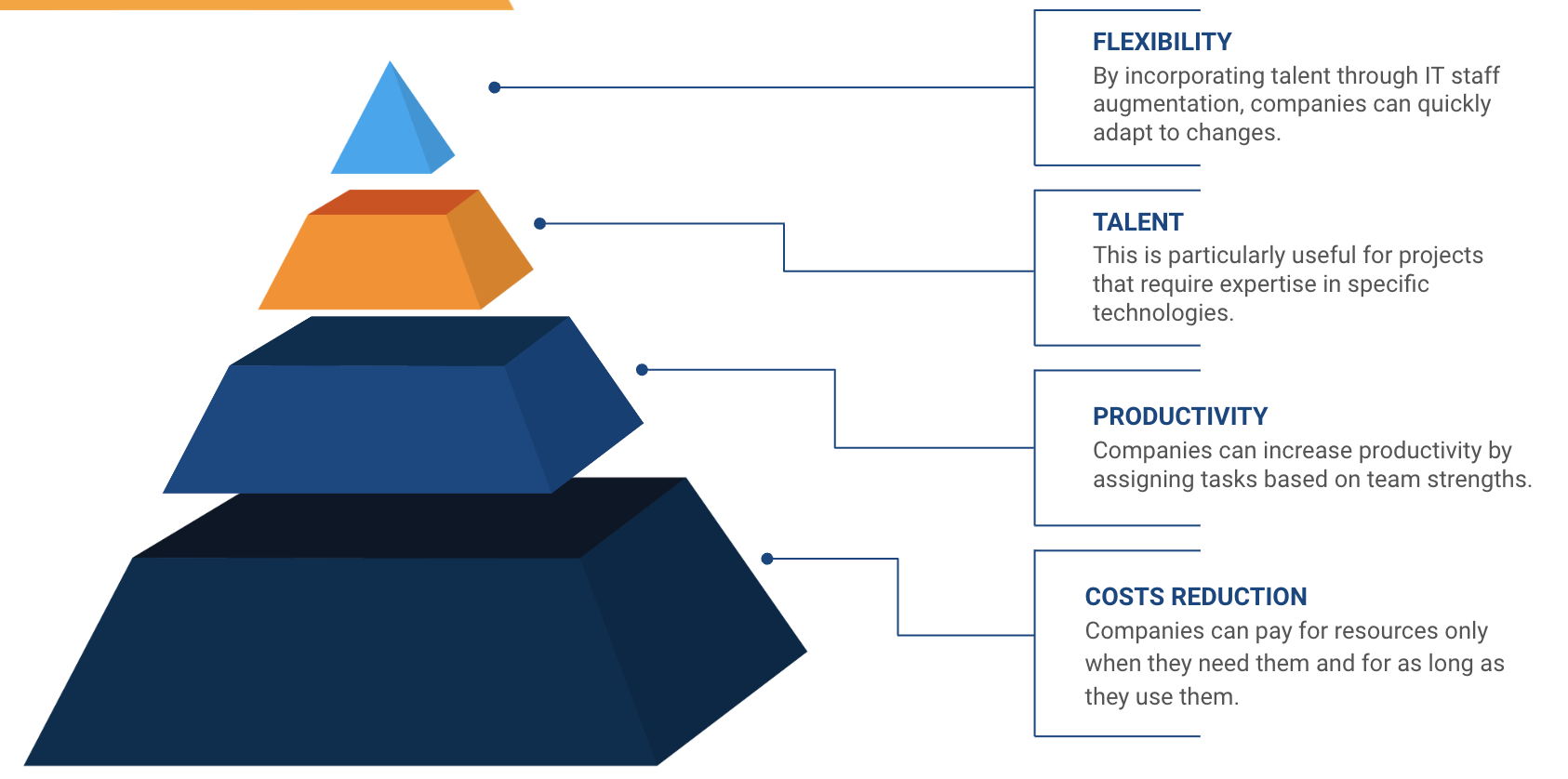
Business leaders are most of the time working under the pressure of obtaining the best results in their operations, but dealing at the same time with reducing costs and improving efficiency. As if that were not enough, every day they struggle to find the technological talent they need to not only complete their projects, but also inject innovation into their company.
“Nearly 90% of leaders said recruiting and retaining talent was a moderate or major challenge. Additionally, 72% rated “meeting the broader needs of workers” as a moderate or major challenge”, they explained in a Deloitte report, expanding the picture on this topic. They added that the most difficult positions to fill are high-level technical positions, such as systems architects, cybersecurity experts and artificial intelligence specialists.
In each and every one of these areas, the IT staff augmentation service can be of great support and in this article we will talk about how this modality can help you diversify all the skills of your internal software team.

Let's take a quick look at the IT staff augmentation service
IT staff augmentation is a model in which a company hires external resources, such as developers, software engineers or information technology specialists, to work alongside its internal team on specific projects. Unlike traditional outsourcing, where the entire project is subcontracted to a third party, staff augmentation involves the integration of external talent into the company's internal team.
The role of IT staff augmentation in the diversification of software team skills
IT staff augmentation plays a crucial role in diversifying software team skills by providing access to external talent with a variety of skills and experience. This allows companies to tackle a wide range of projects and technologies without the need to hire a diversified internal team for each of them.
“Four of the top five skills that employers surveyed said they were lacking were digital, including Generative Artificial Intelligence (AI) or machine learning, data science, coding and cybersecurity”, they commented in a Deloitte article, about the gap of skills that companies face today. This situation sometimes seems like a dead end for business, but it doesn't have to be that way: through IT staff augmentation you can find expert and specialized personality in many areas, both classic and innovative.
For example, a software development company may need developers with experience in different programming languages, such as Java, Python, JavaScript, etc. Hiring an in-house team with expertise in all of these areas can be expensive and impractical. Instead, using the IT staff augmentation service, the company can hire external developers with the specific skills needed for each individual project.

In addition, IT staff augmentation allows companies to quickly adapt to changes in the market and in the demand for emerging technologies. For example, if a company decides to adopt a new technology, such as artificial intelligence or machine learning, it may be difficult to find internal talent with expertise in these areas. Instead of hiring and training new employees, the company can use staff augmentation to hire external resources with the necessary experience to implement the new technology effectively.
Technical skills gaps that will be present in the coming years
Just as technology advances, technical skills needs and gaps also arise in companies. Sometimes internal software teams do not have the ability to learn new technologies at high speed, creating gaps in the teams.
One of the areas that has advanced the most and that probably creates one of the widest gaps is that of Artificial Intelligence. “Executives estimate that up to 40% of their workforce could need to be retrained as a result of implementing AI or automation in the next three years”, said the World Economic Forum in a recent report published in January 2024.
“The most significant skills gap will be finding and developing engineering skills in training AI models, handling data, and knowing how AI works under the hood”, they added in a Forbes article.
In this same article, they also mentioned that in the areas of cybersecurity, data privacy, cloud computing, and Java programming, this skills gap could also occur.

Benefits of skill diversification on the software team
Diversifying skills on the software team offers a number of significant benefits to companies, including:
Flexibility
By bringing in external talent as needed through IT staff augmentation, companies can quickly adapt to changes in project demand or new technologies without the need for long-term hires.
Access to specialized talent
IT staff augmentation allows companies to access specialized talent that may not be available internally. This is particularly useful for projects that require expertise in specific technologies or proficiency in specialized areas.

Productivity increase
By having a diversified team of experts in different areas, companies can increase productivity by assigning tasks based on the individual strengths of each team member.
Product quality improvement
By having an IT staff augmentation team with a wide range of skills and experience, companies can improve the quality of their products by more effectively addressing a variety of technical and business challenges.
Costs reduction
Hiring external talent through IT staff augmentation can be more economical than hiring full-time employees, since companies can pay for resources only when they need them and for the time they use them.
Do you need an IT staff augmentation team to create your next software product? At Rootstack, we have +14 years of experience supporting companies in their digital transformation. Contact us.

